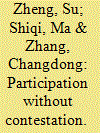|
|
|
Sort Order |
|
|
|
Items / Page
|
|
|
|
|
|
|
| Srl | Item |
| 1 |
ID:
186947


|
|
|
|
|
| Summary/Abstract |
How do non-governmental organizations (NGOs) advocate public policies? What impacts their advocacy strategies? Although scholars have addressed these questions in a democratic context, less is known about NGO advocacy under powerful authoritarian regimes. Using China as a case study, we develop an institutional explanation of NGOs’ policy advocacy patterns and explore the impacts of NGO autonomy. Using a unique dataset of registered NGOs in three Chinese provinces, we find that NGOs with more autonomy tend to conduct direct negotiations with the government more actively (more political advocacy). However, these more autonomous NGOs are likely to be more hesitant to mobilize society from the bottom up (less social advocacy). These findings enrich our knowledge of social actors’ roles in the policymaking process in China.
|
|
|
|
|
|
|
|
|
|
|
|
|
|
|
|
| 2 |
ID:
151405


|
|
|
|
|
| Summary/Abstract |
China holds direct elections for deputies to serve in the Local People’s
Congress (LPC) at the county and township levels. As the LPC gains
more power and private entrepreneur deputies emerge as the second
largest deputy group in many regions, it seems possible that the LPC
will become more representative and therefore make local government
more responsive. Th e author performed intensive fi eldwork to investigate
whether this might be occurring, but found that the LPC is more
like an inclusive institution, sometimes degenerating into patron clientelism,
rather than a representative institution. In addition, direct elections
are tightly controlled and sometimes deteriorate into personalized
patronages, because private entrepreneurs purchase votes to win
personal privileges, rather than to promote institutional reform.
|
|
|
|
|
|
|
|
|
|
|
|
|
|
|
|
| 3 |
ID:
181845


|
|
|
|
|
| Summary/Abstract |
State capacity and state power are two related but different concepts; both have reattracted more and more attention in comparative politics and Chinese politics in recent years. Integrating new theoretical developments, this introductory article clarifies and refines these two concepts by linking them with the Weberian and Tocquevillian theories of state accordingly. The Weberian discussions lay the foundation of state capacity, specifically meaning utilizing state organizing ability and bureaucratic system to implement governmental functions. Viewed from the Tocquevillian perspective, state power refers to how a state's organizational configurations shape society and how a state's overall patterns of activities shape social actors' behavior and demands, therefore state capacity. Based on these theories, the five articles in this special issue are categorized into two groups: in the Weberian perspective group, two articles examine state capacities in different policy domains (policing and innovation), and one examines how campaigns interact with bureaucratic institutions to shape state capacities; in the Tocquevillian perspective group, the two articles examine state power, that is, how state configurations and patterns of activities shape social actors' political demands and participations. This introduction finally explores the paths to future studies of China's state capacity and power.
|
|
|
|
|
|
|
|
|
|
|
|
|
|
|
|
| 4 |
ID:
181850


|
|
|
|
|
| Summary/Abstract |
Do Chinese nongovernmental organizations (NGOs) conduct policy advocacy? If so, how are they shaped by the state power? Following the Tocquevillian perspective of the state, we use an institutional analytical framework and disaggregate China's political institutions into three levels. We then investigate how Chinese NGOs' advocacy strategies are shaped and constrained at each level. Using the survey data from three provinces, we find that Chinese NGOs prefer political advocacy to social advocacy, though both are limited. They target government branches and advocate policies through supervisory units more frequently than the legislature or judiciary. We also find that NGOs' operational organizational autonomy is negatively associated with the likelihood that NGOs would engage in all types of advocacy channels. These findings suggest that, on one hand, state power substantially shapes NGOs' policy advocacy channels. On the other hand, NGOs' policy advocacy strengthens state capacity without reducing state autonomy.
|
|
|
|
|
|
|
|
|
|
|
|
|
|
|
|
|
|
|
|
|